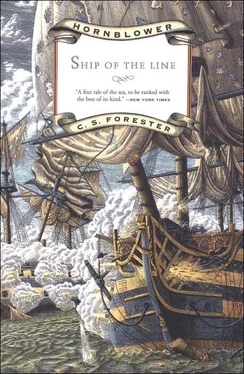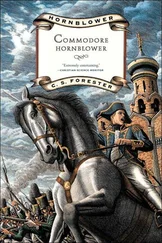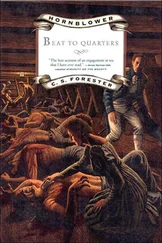There below him, a mile away but seemingly much nearer in the clear air, lay the town of Rosas. Hornblower could recognise all the features of the place which his map indicated. To the right was the citadel—from his elevated position Hornblower could see the pentagonal outline of its grey ramparts, with the blue sea behind. In the centre was the town itself, a single long street lying close to the shore, with a line of earthworks guarding it on the landward side. To the left was the high tower of Fort Trinidad on the other flank. The weakest point was undoubtedly the centre, but it would be of little use assailing that, as the citadel and the Trinidad could hold out independently. The best course would be to take the bull by the horns and breach and storm the citadel by an attack delivered from close by the water’s edge. The town could not be held if the citadel fell, although the Trinidad might cause further trouble.
Hornblower had allowed his thoughts to run away with him. He had been so busy planning the reduction of Rosas that he had not even noticed the general peacefulness of the scene. The tricoloured flags flapped idly from the flagstaffs in the citadel and the Trinidad, and they were the most warlike things in sight. There was no sign on the bare plain of any besieging army. Meanwhile it could only be a question of hours before the garrison discovered how near to them lay a valuable convoy, and how weak was the force guarding it.
“Where is the army of Catalonia?” Hornblower demanded angrily, of Claros. He received a deprecatory shrug of the shoulders.
“I do not know, Captain.”
To Hornblower it meant that his precious convoy, and his far more precious landing party, were strung out over three miles of country within easy reach of any column which the governor of Rosas might send out.
“You told me Colonel Rovira was marching on Rosas last night!”
“He seems to have been delayed.”
“The messenger—the one you said you would send at dawn—has he returned?”
Claros, by a raising of his eyebrows and a jerk of the head, passed this question on to the chief of staff.
“He did not go,” said this officer.
“ What? ” said Hornblower in English. He had to fight down his bewilderment and struggle with his dazed senses in order to speak Spanish again. “Why not?”
“It would have put the officer to unnecessary trouble,” said the chief of staff. “If Colonel Rovira comes, he comes. If he cannot, no message of ours will bring him.”
Hornblower pointed over to the right. In a fold of the hills a line of some fifty picketed horses and a few groups of seated men indicated the position of the squadron of cavalry which had been watching the town since yesterday.
“Why did they not report that Colonel Rovira had not arrived?” he demanded.
“The officer commanding had my orders to report when he did arrive,” answered Claros.
He was showing no signs of indignation at the barely concealed contempt in Hornblower’s expression, but Hornblower kept his rage in hand for a little longer in his endeavour to keep the enterprise alive.
“We are in a very considerable danger here,” he said.
Claros shrugged his shoulders again at the Englishman’s timidity.
“My men are used to the mountains. If the garrison comes out to attack us we can get away by goat paths over there,” he answered, pointing away to the precipitous sides of the mesa in the distance. “They will never dare to follow us there, and if they did they would never catch us.”
“But my guns? My men?”
“In war there is always danger,” said Claros loftily.
Hornblower’s answer was to turn to Longley.
“Ride back at once,” he said to the boy. “Halt the guns. Halt the convoy. Halt every man on the path. Nothing is to move a yard farther without orders from me.”
“Aye aye, sir.”
Longley wheeled his horse round and clattered off; the boy had somewhere learned to ride well before coming to sea. Claros and his staff, Hornblower and Brown, all watched him go, and then turned back to face each other. The Spaniards could guess what were the orders that had been given him.
“Not a gun or a man of mine will stir,” said Hornblower, “until I see Colonel Rovira’s army on the plain there. Will you be good enough to send a message to him now?”
Claros tugged at his long moustache and then gave the order to his staff; his junior officers argued sulkily with each other before one of them took the note written by the chief of staff and set off with it. Clearly no one relished the prospect of a ride of perhaps twenty miles under a hot sun in search of Rovira’s column.
“It is nearly the hour for dinner,” said Claros. “Will you have my men’s food served out to them, Captain?”
Hornblower’s jaw dropped at that. He had thought nothing more could surprise him, and he was proved wrong. Claros’ tobacco-brown face gave no indication that he thought there was anything other than what was strictly ordinary in his assumption that his thousand men were to feed on the stores laboriously landed from the squadron. It was on the tip of Hornblower’s tongue to refuse pointblank, but he stopped to consider. He guessed that if they were not fed, Claros’ men would simply melt away in search of food, and there was still a faint chance that Rovira might arrive and the siege be taken in hand. For the sake of that chance, it was as well to make this concession and make the most of the few hours granted them before their presence should be discovered.
“I will give orders for it,” he said, and the dignified colonel’s expression showed no change at either demanding or receiving favours from the Englishman with whom he had just been on the verge of quarrelling.
Soon sailors and Catalans were all of them eating heartily. Even the squadron of cavalry smelt food from afar, like vultures, and rode hastily back to job in the feast, leaving only an unhappy half dozen to continue the watch over Rosas. Claros and his staff seated themselves in a group ministered to by orderlies. And as was to be expected, comida was followed by siesta—after a vast meal every Spaniard stretched himself in the shade which the shrub afforded, and snored, flat on his back, with a Peninsula disregard for the flies which buzzed over his open mouth.
Hornblower neither ate nor slept. He dismounted and gave his horse over into Brown’s charge, and then hobbled up and down on his hill top looking down at Rosas, with his heart full of bitterness. He had written carefully to the admiral to explain the reason of his halt—carefully, because he did not want to belong to the type of officer who sees difficulties at every turn—and the answer had simply enraged him. Was it not possible, Leighton had asked in his reply, to attempt something against the fortress with the fifteen hundred men he had in hand? Where was Colonel Rovira? The tone of that question indicated that Hornblower was somehow at fault regarding Rovira’s non-arrival. Captain Hornblower must remember the need to work in the closest and most cordial co-operation with England’s allies. The squadron could not possibly continue to supply Rovira’s force with food for long; Hornblower must tactfully call Colonel Rovira’s attention to the need of drawing upon his own sources of supplies. It was highly important that the arrival of the British squadron should be signalised by a great success, but on no account was any operation to be undertaken which might imperil the safety of the landing party. Leighton’s letter was a completely futile piece of writing, having regard for the present facts, but a Court of Inquiry who knew nothing of them would consider it eminently sane and sensible.
“Begging your pardon, sir,” said Brown, suddenly. “The Froggies down there is on the move.”
Читать дальше









